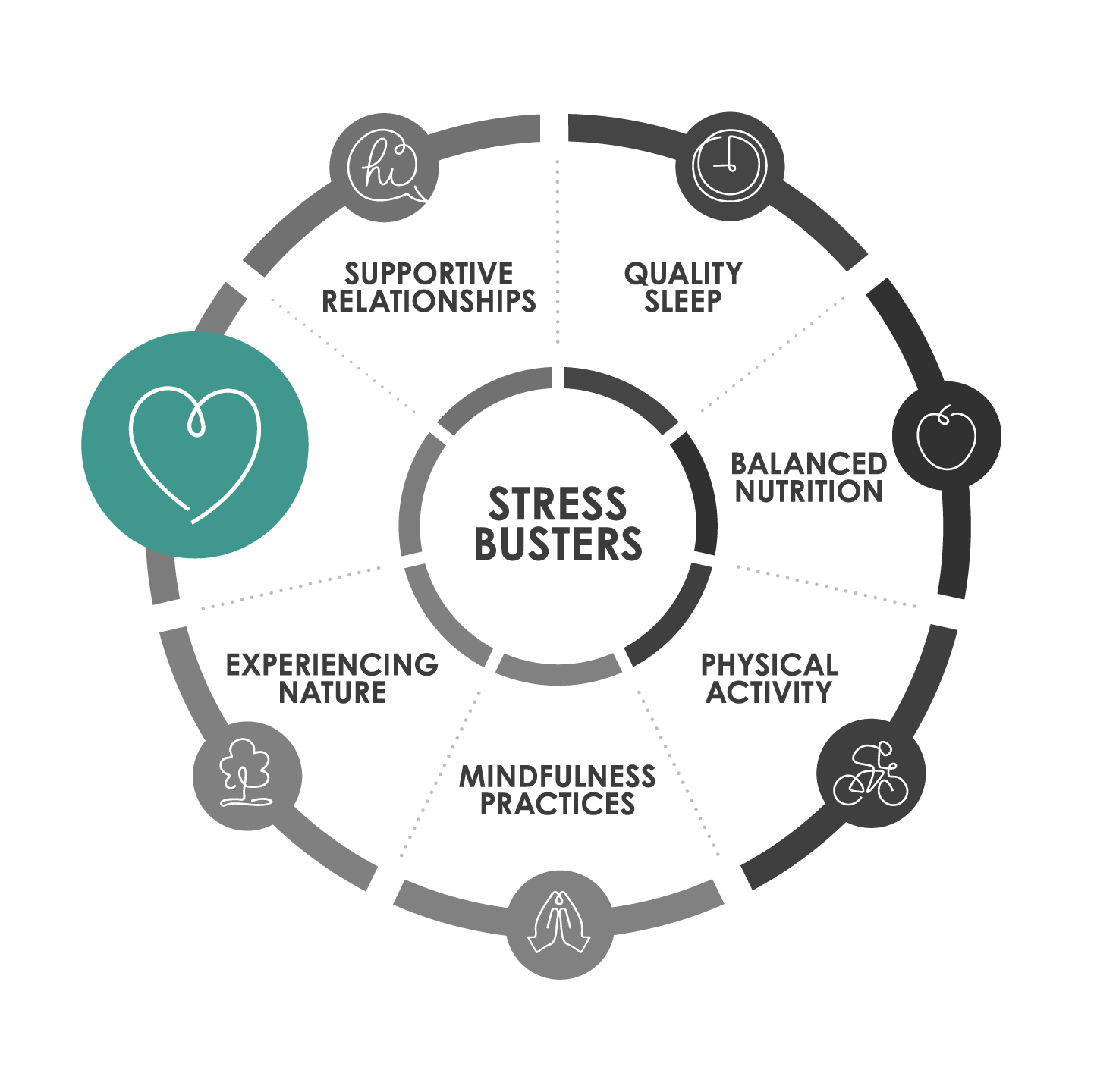Stress Busters Resources for Professionals | Mental Healthcare

A list of resources for health care professionals and community-based organizations on helping clients with their Mental Healthcare.
See CBO toolkit for additional resources by Stress Buster.
ACES AWARE RESOURCES
- Download the ACEs Aware Mental Healthcare Stress Buster handout (English | Spanish)
- Stress Busters Toolkit for Community-Based Organizations
- Stress Busters: Clinical Strategies for Preventing and Mitigating Toxic Stress (Free online training course)
- Mental Healthcare Stress Buster resources for everyone
FIND A THERAPIST
- Psychology Today searchable database (if have private insurance)
- Psychology Today searchable database of therapists who accept Medi-Cal
- People with Medi-Cal can call their local health plan or the Medi-Cal Mental Health Care Ombudsman at (800) 896-4042 and ask for a mental health assessment or needed services. For additional information regarding how to access mental health services in California, see: https://www.dhcs.ca.gov/services/MH.
- Therapy Project California: Current or former foster youth in California can get free teletherapy if they are referred via this form.
TRAUMA THERAPIES
- Child-Parent Psychotherapy (ages birth to 6 years): Dyadic intervention for young children and their caregivers that supports family strengths and relationships.
- Parent-Child Interaction Therapy (2 to 12 years): Dyadic parent training treatment that emphasizes improving the quality of the parent-child relationship and pattern of parent-child interactions.
- Attachment & Biobehavioral Catch-up (ABC) (Birth to middle school): A strengths-based, focused, brief (10, 1-hour weekly sessions) dyadic, home-visiting program.
- Trauma-Focused Cognitive Behavioral Therapy (TF-CBT) (verbal children and adults): A structured, short-term treatment model for children and adults who have experienced trauma.
- Eye Movement Desensitization Reprocessing (EMDR) (adolescents and adults): EMDR is focused on helping people resolve unprocessed traumatic memories.
- Internal Family Systems (verbal children and adults): A non-pathologizing psychotherapy that works with people as a system of protective and wounded inner parts led by a core self and provides personal understanding of intimate relationships.
- Family Systems Therapy (verbal children and adults): Supports resolving family conflict or issues.
- Cognitive Processing Therapy (adolescents and adults): A type of cognitive behavioral therapy, generally 12 sessions, that helps modify maladaptive thinking related to trauma.
- Prolonged Exposure Therapy (adolescents and adults): A cognitive behavioral therapy approach that helps people gradually approach their memories, feelings and situations of trauma.
- Somatic Therapy (all ages): An approach that focuses on how emotions and stress appear in the body and tools to regulate the autonomic nervous system.
- Biofeedback and Neurofeedback (young children to adults): A type of therapy that allows people to see their physiology in real-time (e.g. heart rate, coherence, brain wave patterns) to learn strategies to control their physiology.
DIRECTORIES FOR EVIDENCE-BASED PRACTICES AND RESOURCES
- Resources from the National Child Traumatic Stress Network (NCTSN)
- Evidence-Based Practices Resource Center (Substance Abuse and Mental Health Services Administration)
- California Evidence-Based Clearinghouse for Child Welfare (CEBC)
MENTAL HEALTH AND SUBSTANCE USE DISORDERS AND HARM REDUCTION RESOURCES
Resources and information to help people find treatment options.
- Mental Health First Aid provides a wide variety of mental health resources.
- Findtreatment.gov is a confidential and anonymous resource for people seeking treatment for mental and substance use disorders.
- Information from SAMHSA about harm reduction, an evidence-based approach to engaging with people who use drugs and equipping them with life-saving tools
INFORMATION ABOUT MENTAL HEALTH CRISES
- Navigating a Mental Health Crisis: A NAMI Resource Guide for Those Experiencing a Mental Health Emergency (National Alliance on Mental Illness (NAMI)
- Warning Signs of Suicide (NAMI)
- Warning Signs of a Mental Health Crisis (NAMI)
NEURODIVERSITY RESOURCES
Resources for working with neurodivergent individuals (people who are autistic or have other neurological or developmental challenges like attention-deficit/hyperactivity disorder (ADHD), dyslexia, or other learning disabilities, who are at increased risk for ACEs and mental health challenges.
- Understood: Nonprofit providing free, expert-vetted resources and support to people with learning and thinking differences
- AASPIRE Toolkit: Provides information and worksheets for adults on the autism spectrum, supporters, and health care providers
- All Brains Belong: Nonprofit community health organization working to make life better for people with all types of brains; provides neurodiversity-affirming medical care, social connection, employment support, and neurodiversity education
- Autistic Self Advocacy Network: Nonprofit organization run by and for autistic people that seeks to advance the principles of the disability rights movement with regard to autism
- Autistic Women and Nonbinary Network: A non-profit committed to disability justice, gender and racial equity, neurodiversity and trans liberation with a focus on transformative and restorative justice in disability spaces
FOR MORE INFORMATION
Literature linking various behavioral and mental health therapies with improved mental health outcomes, and summaries of best practices:
- The National Academies of Sciences, Engineering, and Medicine’s report, Fostering Healthy Mental, Emotional, and Behavioral Development in Children and Youth: A National Agenda
- Facing Addiction in America (U.S. Surgeon General)
- The National Child Traumatic Stress Network (NCTSN)
- Evidence-Based Practices Resource Center (SAMHSA)
- The California Evidence-Based Clearinghouse for Child Welfare (CEBC)
- “What is the Mental Health Continuum?” (Madhuleena Roy Chowdry, Positive Psychology)
- Find your local regional center
FIND A TRAUMA-INFORMED CLINICIAN
Find Medi-Cal providers who have completed the certified Becoming ACEs Aware in California training.
FOR PEOPLE WITHOUT HEALTH INSURANCE
- Help with Medi-Cal, health coverage, and other benefits: https://www.dhcs.ca.gov/services
- Free primary care services: http://www.californiafreeclinics.org